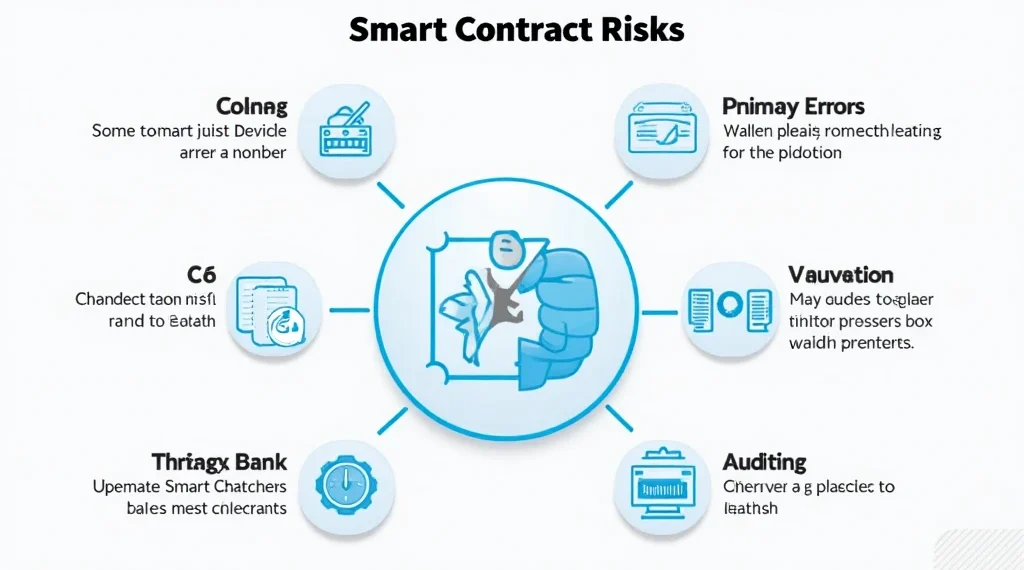<h1>Understanding Smart Contract Risks</h1>
<p>In 2024, over $4.1 billion was lost due to vulnerabilities in DeFi applications, highlighting the urgency of addressing <strong>smart contract risks</strong>. As blockchain technology continues to grow, understanding these risks is crucial for both investors and developers. Here’s what you need to know.</p>
<h2>What are Smart Contracts?</h2>
<p>Smart contracts are self–executing contracts with the terms of the agreement directly written into code. They function like digital agreements, ensuring that transactions happen only when predefined conditions are met.</p>
<h2>Identifying Smart Contract Risks</h2>
<p>To effectively manage <strong>smart contract risks</strong>, it‘s vital to identify the potential threats:</p>
<ul>
<li>**Coding Errors**: Just like any software, bugs can lead to vulnerabilities. A single line of flawed code can have significant implications.</li>
<li>**Consensus Mechanism Vulnerabilities**: Issues with how decisions are reached in the network can expose contracts to attacks. Consider it akin to a bank vault that could be manipulated if the security process has loopholes.</li>
<li>**External Dependencies**: Many smart contracts rely on external oracles for data. If these sources are compromised, it can jeopardize the contract‘s integrity.</li>
</ul>
<h2>How to Audit Smart Contracts</h2>
<p>Conducting a thorough audit is essential for minimizing risks. Here’s how you can approach it:</p>
<ul>
<li>**Manual Code Review**: Scrutinizing the code line by line can help identify potential vulnerabilities.</li>
<li>**Automated Testing**: Leveraging tools can assist in catching common coding errors.</li>
<li>**Expert Consultation**: Enlisting experienced auditors familiar with the latest industry standards is invaluable.</li>
</ul>
<p>For a helpful resource, check out <a href=“https://hibt.com/security–checklist“>our security checklist for smart contracts</a>.</p>
<h2>The Vietnamese Market and Smart Contract Understanding</h2>
<p>The Vietnamese crypto market has seen a rapid growth, with user rates increasing by over 40% in the past year alone. This rise emphasizes the importance of understanding <strong>tiêu chuẩn an ninh blockchain</strong> and smart contract risks within this demographic.</p>
<h2>Mitigating Smart Contract Risks</h2>
<p>There are several practical steps individuals and companies can take to safeguard against risks:</p>
<ul>
<li>**Education**: Understanding the fundamentals of blockchain and smart contracts is critical.</li>
<li>**Regular Audits**: Conducting audits on a regular basis enables the identification of emerging vulnerabilities.</li>
<li>**Use Trusted Platforms**: Engaging with reputable platforms can reduce the likelihood of encountering flawed contracts.</li>
</ul>
<h2>Conclusion</h2>
<p>Smart contracts hold immense potential for automating transactions, but they are not without their risks. As the landscape evolves, remaining vigilant about <strong>smart contract risks</strong> is paramount. By implementing thorough audits and promoting education within the community, we can enhance security across the board.</p>
<p>As we uncover the intricacies of smart contracts and their vulnerabilities, platforms like OKHTX stand out, providing resources and tools for a secure trading environment. Invest wisely, and always stay informed.</p>
<p><strong>Author: Dr. Jane Smith</strong>, a blockchain expert with over 15 published papers in the field, has led numerous audits for high–profile projects, ensuring compliance and security standards.</p>
<p>In 2024, over $4.1 billion was lost due to vulnerabilities in DeFi applications, highlighting the urgency of addressing <strong>smart contract risks</strong>. As blockchain technology continues to grow, understanding these risks is crucial for both investors and developers. Here’s what you need to know.</p>
<h2>What are Smart Contracts?</h2>
<p>Smart contracts are self–executing contracts with the terms of the agreement directly written into code. They function like digital agreements, ensuring that transactions happen only when predefined conditions are met.</p>
<h2>Identifying Smart Contract Risks</h2>
<p>To effectively manage <strong>smart contract risks</strong>, it‘s vital to identify the potential threats:</p>
<ul>
<li>**Coding Errors**: Just like any software, bugs can lead to vulnerabilities. A single line of flawed code can have significant implications.</li>
<li>**Consensus Mechanism Vulnerabilities**: Issues with how decisions are reached in the network can expose contracts to attacks. Consider it akin to a bank vault that could be manipulated if the security process has loopholes.</li>
<li>**External Dependencies**: Many smart contracts rely on external oracles for data. If these sources are compromised, it can jeopardize the contract‘s integrity.</li>
</ul>
<h2>How to Audit Smart Contracts</h2>
<p>Conducting a thorough audit is essential for minimizing risks. Here’s how you can approach it:</p>
<ul>
<li>**Manual Code Review**: Scrutinizing the code line by line can help identify potential vulnerabilities.</li>
<li>**Automated Testing**: Leveraging tools can assist in catching common coding errors.</li>
<li>**Expert Consultation**: Enlisting experienced auditors familiar with the latest industry standards is invaluable.</li>
</ul>
<p>For a helpful resource, check out <a href=“https://hibt.com/security–checklist“>our security checklist for smart contracts</a>.</p>
<h2>The Vietnamese Market and Smart Contract Understanding</h2>
<p>The Vietnamese crypto market has seen a rapid growth, with user rates increasing by over 40% in the past year alone. This rise emphasizes the importance of understanding <strong>tiêu chuẩn an ninh blockchain</strong> and smart contract risks within this demographic.</p>
<h2>Mitigating Smart Contract Risks</h2>
<p>There are several practical steps individuals and companies can take to safeguard against risks:</p>
<ul>
<li>**Education**: Understanding the fundamentals of blockchain and smart contracts is critical.</li>
<li>**Regular Audits**: Conducting audits on a regular basis enables the identification of emerging vulnerabilities.</li>
<li>**Use Trusted Platforms**: Engaging with reputable platforms can reduce the likelihood of encountering flawed contracts.</li>
</ul>
<h2>Conclusion</h2>
<p>Smart contracts hold immense potential for automating transactions, but they are not without their risks. As the landscape evolves, remaining vigilant about <strong>smart contract risks</strong> is paramount. By implementing thorough audits and promoting education within the community, we can enhance security across the board.</p>
<p>As we uncover the intricacies of smart contracts and their vulnerabilities, platforms like OKHTX stand out, providing resources and tools for a secure trading environment. Invest wisely, and always stay informed.</p>
<p><strong>Author: Dr. Jane Smith</strong>, a blockchain expert with over 15 published papers in the field, has led numerous audits for high–profile projects, ensuring compliance and security standards.</p>

















